How Michael Vuytowecz Ended Up in Panama, and How His Wife Martha Was Convinced to Even Visit
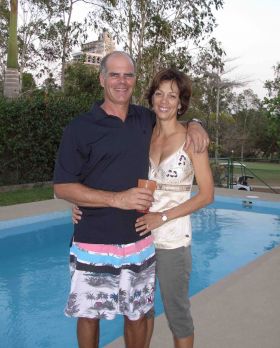 From an interview with Michael Vuytowecz in July, 2016...
From an interview with Michael Vuytowecz in July, 2016... Chuck: You have led a very interesting life, Michael. You’ve lived in some great places that would make a lot of people quite jealous, including Boston, Lake Tahoe, San Diego, and of course Panama, which is where you live now. Tell us a little bit about how everything came to be.
Michael: I grew up in Massachusetts, and immediately after high school, I had a small nightclub for a couple of years. The drinking age at that time was only 18 in Massachusetts. The father of a friend who I grew up with owned the nightclub and turned it over to us.
I felt the itch to travel, so when I was almost 21, I went to California. My first trip to California didn’t work out so well. I ran out of money. I had to call my folks to get a plane ticket to go back home.
Then I was invited to Lake Tahoe to visit a friend who had worked for me at the club. I went out to visit him and ended up staying for 7 years. The beauty of Lake Tahoe and the skiing and fantastic summers immediately captivated me. Every winter, I would say, “I’ll just stay one more winter,” and when summer would come; one more summer. Seven years went by this way. I eventually met my wife, Martha there, and decided to give up skiing, casinos, partying, and cocktail waitresses because 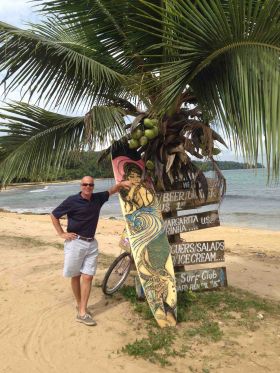 we decided we wanted to get married.
we decided we wanted to get married.
 we decided we wanted to get married.
we decided we wanted to get married. Martha and I moved to San Diego because that’s where her family was, and so we could seek a more traditional career, instead of the food and beverage industry and the bartending I had been doing in the casinos. My choice was to seek out a career in the mortgage business. Just by coincidence my wife’s sister was married to a fella who was in the mortgage business. He suggested that he could train me. What I didn’t know before I agreed was he had a one-man operation. His offer to train me had good intentions, but he was really too busy to train me.
I eventually went to work for a mortgage bank. They offered a training program and I took if from there. Eventually I ended up becoming southwest regional manager for that company. Then I opened my own mortgage brokerage company and eventually gravitated into real estate as well.
In the 80s when we experienced the first Real Estate meltdown, a lot of the Real Estate companies were seeking other sources of revenue to keep their doors open and they saw that the mortgage guys that were soliciting mortgage loans for their buyers were taking the revenue with them, so some of the Real Estate companies decided to get into the mortgage business. I used that as my opportunity to cross over and get into the real estate business. This was something that I had wanted to do previously, but felt it would be a risk to start to compete with the 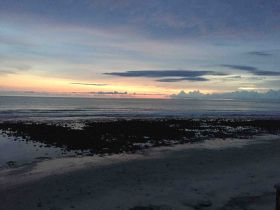 same agents that were providing me the loan business. I felt that with a mortgage and finance background, I could likely do a better job selling real estate than they could going from the real estate business to the mortgage business. It turned out to be the best thing I ever did. I ended up owning and operating a Real Estate & Mortgage company in San Diego for 15 years.
same agents that were providing me the loan business. I felt that with a mortgage and finance background, I could likely do a better job selling real estate than they could going from the real estate business to the mortgage business. It turned out to be the best thing I ever did. I ended up owning and operating a Real Estate & Mortgage company in San Diego for 15 years.
 same agents that were providing me the loan business. I felt that with a mortgage and finance background, I could likely do a better job selling real estate than they could going from the real estate business to the mortgage business. It turned out to be the best thing I ever did. I ended up owning and operating a Real Estate & Mortgage company in San Diego for 15 years.
same agents that were providing me the loan business. I felt that with a mortgage and finance background, I could likely do a better job selling real estate than they could going from the real estate business to the mortgage business. It turned out to be the best thing I ever did. I ended up owning and operating a Real Estate & Mortgage company in San Diego for 15 years. Around 2003 or 2004, the Mortgage industry began to change the way they were underwriting the loans. You could secure a 100% mortgage without have to qualify. You no longer had to prove your income, and you didn’t have to verify your assets, etc. It was based purely on your credit score. I sensed something was wrong with our industry, and I really didn’t think it was going to be sustainable. I didn’t see how we could make loans to people that had demonstrated no willingness or ability to pay us back yet nobody seemed to care. I started getting a bit nervous about it and decided to get out. It turned out I was a bit early. I could have continued to make money for a couple more years, but I decided to 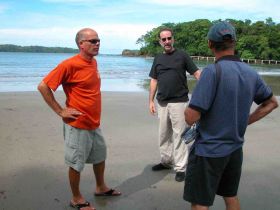 retire, take my chips off the table, and just manage my own portfolio of properties, which I did, as well as playing golf most days for a couple of years. And then frankly, I got bored.
retire, take my chips off the table, and just manage my own portfolio of properties, which I did, as well as playing golf most days for a couple of years. And then frankly, I got bored.
 retire, take my chips off the table, and just manage my own portfolio of properties, which I did, as well as playing golf most days for a couple of years. And then frankly, I got bored.
retire, take my chips off the table, and just manage my own portfolio of properties, which I did, as well as playing golf most days for a couple of years. And then frankly, I got bored. I missed doing deals. I missed really being “in there.” I started looking online at emerging markets. The top places that came up as emerging markets at that time where Vietnam, India, Croatia, to name a few. Of course those locations were out of the question. Martha won’t even hear about it. They were too far away, the language barrier was a daunting challenge, they used had a currency I’d never figure out, and I would likely have to change my diet from what I had grown up with. Anyway, it just wasn’t going to happen. So I started looking further down the list.
I looked at Nicaragua and then I looked at Costa Rica, but when I got to Panama, it was about number seven or eight on the list, It seemed to me, however, at least from afar, online, that Panama was more palatable for a North American. I could see right away 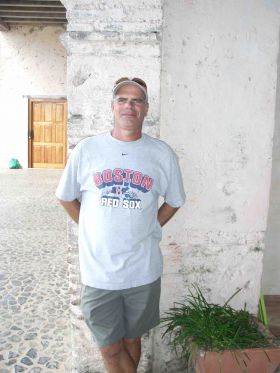 that it offered what a lot of the other Latin American countries didn’t, in as much as it had an economic engine with the canal, and that engine provided some of what the other Central American countries didn’t have. Panama was easily accessible, it was affordable, had good infrastructure, good roads, reliable electricity, and you could drink the water out of the tap! It also had good medical care, and it traded in the US dollar. All of this was attractive to me as a North American. Martha wasn’t buying into it yet but it was certainly more attractive than India, Vietnam, and some of the others.
that it offered what a lot of the other Latin American countries didn’t, in as much as it had an economic engine with the canal, and that engine provided some of what the other Central American countries didn’t have. Panama was easily accessible, it was affordable, had good infrastructure, good roads, reliable electricity, and you could drink the water out of the tap! It also had good medical care, and it traded in the US dollar. All of this was attractive to me as a North American. Martha wasn’t buying into it yet but it was certainly more attractive than India, Vietnam, and some of the others.
 that it offered what a lot of the other Latin American countries didn’t, in as much as it had an economic engine with the canal, and that engine provided some of what the other Central American countries didn’t have. Panama was easily accessible, it was affordable, had good infrastructure, good roads, reliable electricity, and you could drink the water out of the tap! It also had good medical care, and it traded in the US dollar. All of this was attractive to me as a North American. Martha wasn’t buying into it yet but it was certainly more attractive than India, Vietnam, and some of the others.
that it offered what a lot of the other Latin American countries didn’t, in as much as it had an economic engine with the canal, and that engine provided some of what the other Central American countries didn’t have. Panama was easily accessible, it was affordable, had good infrastructure, good roads, reliable electricity, and you could drink the water out of the tap! It also had good medical care, and it traded in the US dollar. All of this was attractive to me as a North American. Martha wasn’t buying into it yet but it was certainly more attractive than India, Vietnam, and some of the others. So, after two years of trying to convince my wife, I came for an exploratory trip with her. I think that she was hoping that this crazy idea would pass so she came along just to appease me. Right away, I was hooked. Coming from a Real Estate and Mortgage background, being able to quantify market data was important to me, and the first thing I noticed when I came to Panama was there was literally no quantifiable data available. I couldn’t tell what was a good deal. Coming from San Diego, everything seemed like a fantastic deal to me but I had no way to gauge how much of a good deal any of them were because there’s no comparable data available. Everything is shrouded in secrecy. Properties are held in corporations, or trusts, and property sales prices are declared at something different than what had really transpired in order to avoid taxes, etc. It was certainly a different environment than I was used to in the U.S where sales data was readily available.
So I decided to do my own research. I hired a van and a driver and a video crew and headed out. I wanted to see every inch of 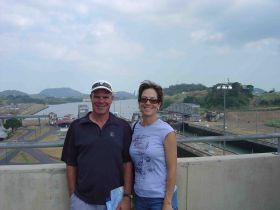 Panama. So we climbed in the van and off we went. The video crew was there to film community profiles of areas that I felt would possibly be marketable. I knew right away that I liked Panama, but everybody that I talked to; my family, and all my associates for 25 years, thought I was crazy. All they had heard about Panama was Noriega, the canal, drug trafficking, and money laundering. Few recognized that Noriega had already been gone for a long time, and that Panama was ready to emerge as a viable player in Latin America. From what I could see, it was already underway.
Panama. So we climbed in the van and off we went. The video crew was there to film community profiles of areas that I felt would possibly be marketable. I knew right away that I liked Panama, but everybody that I talked to; my family, and all my associates for 25 years, thought I was crazy. All they had heard about Panama was Noriega, the canal, drug trafficking, and money laundering. Few recognized that Noriega had already been gone for a long time, and that Panama was ready to emerge as a viable player in Latin America. From what I could see, it was already underway.
 Panama. So we climbed in the van and off we went. The video crew was there to film community profiles of areas that I felt would possibly be marketable. I knew right away that I liked Panama, but everybody that I talked to; my family, and all my associates for 25 years, thought I was crazy. All they had heard about Panama was Noriega, the canal, drug trafficking, and money laundering. Few recognized that Noriega had already been gone for a long time, and that Panama was ready to emerge as a viable player in Latin America. From what I could see, it was already underway.
Panama. So we climbed in the van and off we went. The video crew was there to film community profiles of areas that I felt would possibly be marketable. I knew right away that I liked Panama, but everybody that I talked to; my family, and all my associates for 25 years, thought I was crazy. All they had heard about Panama was Noriega, the canal, drug trafficking, and money laundering. Few recognized that Noriega had already been gone for a long time, and that Panama was ready to emerge as a viable player in Latin America. From what I could see, it was already underway. When I sold real estate in San Diego, I certainly didn’t need to sell the United States, or San Diego. However, I quickly realized from all the negative feedback I got that I was definitely going to need to do a bit of selling for “why Panama” – why I thought it was so great. So the first thing I did was to hire a CNN news anchor to do a 4 or 5 minute piece for me on “why Panama”. I wanted him to break down the incorrect stereotypes that I had encountered, and mentioned earlier, the 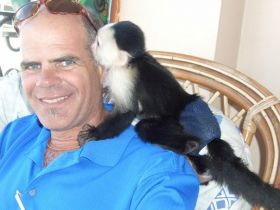 accessibility, affordability, medical care, good infrastructure, the US dollar, etc. and although I didn’t speak Spanish, I could still get by just fine, and the diversity and beauty of the country was amazing!
accessibility, affordability, medical care, good infrastructure, the US dollar, etc. and although I didn’t speak Spanish, I could still get by just fine, and the diversity and beauty of the country was amazing!
 accessibility, affordability, medical care, good infrastructure, the US dollar, etc. and although I didn’t speak Spanish, I could still get by just fine, and the diversity and beauty of the country was amazing!
accessibility, affordability, medical care, good infrastructure, the US dollar, etc. and although I didn’t speak Spanish, I could still get by just fine, and the diversity and beauty of the country was amazing! I began to think of what it would take for me to get Martha to come there, and stay long term, so I tried to document with video the communities that I thought were saleable. As it turns out, at that time, there really weren’t too many yet. There was Panama City, which isn’t for everyone. There was what I call the Gold Coast – the area between Chame and Buenaventura, about an hour to an hour and a half outside of Panama City; and then it was Boquete in the Highlands up towards Costa Rica, which had been voted several years in a row as the best place in the world to retire.
After that everywhere else was sort of on the come. The amenities and the infrastructure hadn’t quite caught up yet. I spent 2 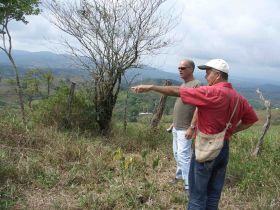 years traveling around, returning regularly to San Diego to check in at home. I literally went around the country twenty-one times. I kept going back to visit all the new and proposed developments and met with the developers and tried to determine fact from fiction as there was literally no data, so I had to compile it myself.
years traveling around, returning regularly to San Diego to check in at home. I literally went around the country twenty-one times. I kept going back to visit all the new and proposed developments and met with the developers and tried to determine fact from fiction as there was literally no data, so I had to compile it myself.
 years traveling around, returning regularly to San Diego to check in at home. I literally went around the country twenty-one times. I kept going back to visit all the new and proposed developments and met with the developers and tried to determine fact from fiction as there was literally no data, so I had to compile it myself.
years traveling around, returning regularly to San Diego to check in at home. I literally went around the country twenty-one times. I kept going back to visit all the new and proposed developments and met with the developers and tried to determine fact from fiction as there was literally no data, so I had to compile it myself. Meanwhile, Martha was back in San Diego hoping that this crazy idea was going to pass, because she didn’t want to leave San Diego, our children, our grandchildren and her parents and Sister, that lived close by, as well as our friends and everything that we had known for 25 years. By then, we were getting much closer to what I thought was going to happen, which was that the financial markets would collapse. Sure enough, in 2008 not only did they collapse, it was much worse than I thought it was going to be. This helped me convince her it was time to go. The original idea was to just go and try to find a place where we could build a stable platform for our children and our grandchildren and maybe one day our parents just in the event that we would need it.
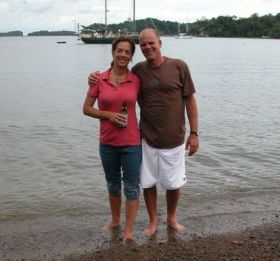
So we purchased a lot in Boquete. Even though I was bored of being retired my only criteria was that I wanted to be on or near a golf course. The lot was located in a soon to be developed private country club with an 18 hole golf course, tennis courts, a hotel, a spa, and all that. They told us when we bought it that the road to get to it would be paved in about a year, and we had two years to build contractually. Of course before we could even think about building, the events of 2008 happened. The financial markets crashed, and most everybody took their foot off the gas, me included, and many others and I didn’t want to build with the economy the way it was at that time.
By then, I had toured around Panama for two years and decided the time was right to launch a real estate company. I felt I had enough information but I didn’t have a house to live in. I had a lot instead. My wife, being from southern California, much preferred the beach to the Highlands anyway so we decided to purchase a home that was already built at the Coronado Golf and Beach Resort, which we did in ’09, and moved full time to Panama. I launched my real estate company there in 2010 and have been at it ever since.
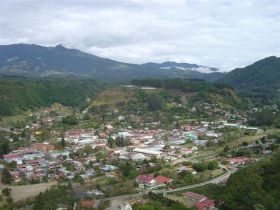
Finally, the project in Boquete did pave the road and the golf course was completed. They’ve since built tennis courts, the clubhouse and the restaurant. A hotel will soon follow. There are homes under construction as well. We’re now building our dream home there. I hope we can move to Boquete full time early next year.
Chuck: It seems like you went through an awful lot or work to convince your wife Martha to move to Panama, from two years of traveling around to hiring a CNN crew, and so forth. How has that all worked out? What did she think of the data? How does Martha feel about it today?
Michael: Ironically I’m not sure if I could get Martha to leave Panama now if I wanted to. She had spent the majority of our marriage raising our children. I was working in the Real Estate and Mortgage industry, and she was a stay-at-home mom. So when 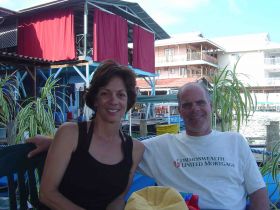 we got to Panama and I was again ready to dive into a new business, she sensed that there wouldn’t be much for her to do. As I started selling condominiums, one of the things that I discovered in Panama is that, unlike the US, when you buy a brand new condominium, it came with nothing in it. There were no lights, there were no fittings, no air-conditioners, no light switches on the walls; it came literally like a shell.
we got to Panama and I was again ready to dive into a new business, she sensed that there wouldn’t be much for her to do. As I started selling condominiums, one of the things that I discovered in Panama is that, unlike the US, when you buy a brand new condominium, it came with nothing in it. There were no lights, there were no fittings, no air-conditioners, no light switches on the walls; it came literally like a shell.
 we got to Panama and I was again ready to dive into a new business, she sensed that there wouldn’t be much for her to do. As I started selling condominiums, one of the things that I discovered in Panama is that, unlike the US, when you buy a brand new condominium, it came with nothing in it. There were no lights, there were no fittings, no air-conditioners, no light switches on the walls; it came literally like a shell.
we got to Panama and I was again ready to dive into a new business, she sensed that there wouldn’t be much for her to do. As I started selling condominiums, one of the things that I discovered in Panama is that, unlike the US, when you buy a brand new condominium, it came with nothing in it. There were no lights, there were no fittings, no air-conditioners, no light switches on the walls; it came literally like a shell. So that meant that the people who purchased condominiums needed to go out and purchase everything, air-conditioners, lights, furniture, and so forth. Something that I hadn’t thought about was the purchasers often didn’t speak Spanish, they didn’t know where to get the items they needed, they weren’t capable of communicating with the people that would come to do the installation, and quite a few of them were purchasing these condos to only use part time or to use when they retired later on down the road. So I suggested to Martha (who speaks fluent 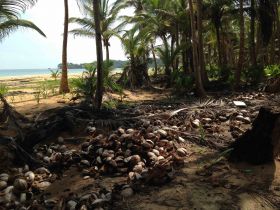 Spanish) that she could open a business to assist these people in buying all the stuff they would need to outfit their unit and then eventually even manage the property for them.
Spanish) that she could open a business to assist these people in buying all the stuff they would need to outfit their unit and then eventually even manage the property for them.
 Spanish) that she could open a business to assist these people in buying all the stuff they would need to outfit their unit and then eventually even manage the property for them.
Spanish) that she could open a business to assist these people in buying all the stuff they would need to outfit their unit and then eventually even manage the property for them. So she would sit down with the clients to determine their tastes, and desires and budget. She would head into the city and go to the furniture stores, bringing her iPad with her. At the store, she would turn it on and be able to show her clients in the States, “Here’s the couches we’re looking at. How do you feel about these?” She would literally outfit their unit and be able to hand them the keys to a turnkey rental that included everything. Needless to say, the business took off like a rocket. We were in the right place at the right time!
Today, Martha manages close to 50 units. Fortunately at the beach, these units are in condo towers so it makes it easier from a logistics standpoint. So today, she has a very healthy property management and design business at the beach. She’s really happy with what she’s doing. She likes it and she’s doing well.
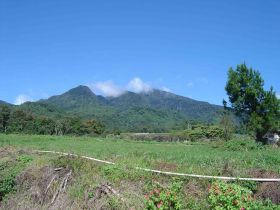
Chuck: You and Martha are a very entrepreneurial couple. It sounds like for the right people there were opportunities in Panama back when you got here. Do you think the same opportunities exist today?
Michael: I think the same opportunities exist today, maybe even more so than they did back then. There is such an explosion of growth that presents the same opportunities in other locations. The economy of Panama is mainly service-related and people who come to Panama who are in the position to be able to provide a service would be the most successful. You can’t come to Panama and work per se. There are labor laws that make it a bit restrictive, but you are allowed to come to Panama and own your own business, so you will be well served to come, check it out and see what type of services that could be provided and then provide that service. If you do a good job, you will very quickly catch on.
Chuck: Your kids still live in the US, right?
Michael: Right. My son is 29 years old and my daughter is 28. My son lived in Panama for approximately a year and a half. He did return back to San Diego but he’s now contemplating coming back again to Panama. The opportunities in the U.S. are a bit more limited, with lots of competition than they were, certainly when I grew up there. Many are considering other options due to the current economic and political climate there now.
Chuck: What other types of opportunities do you think exist? What is next on the agenda for Michael Enterprises? What are you looking at as interesting, from a business perspective?
Michael: Well for us, it all started with one office in Coronado. Today we have 5 locations. I cover the whole country, from Panama City all the way to the Costa Rican border. My daily agenda now along with my partner, is managing the staff, managing the ongoing day-to-day transactions with buyers and sellers, and renters and landlords. And then on top of that of course, I’m building a home.
In addition, I started a small development in Boquete. I really have my hands full. I’m really looking forward to getting my house built and winding down a bit. Maybe I can play more golf.
I have delegated a lot of the business responsibilities. I have a very good staff and they do a great job for me. I’ve always been very good about delegating and promoting from within.
Chuck: Given your experiences and viewpoint, what do you see on the horizon?
Michael: With all the turmoil across the world and in the United States, and the emerging baby boomers, and certainly the current political picture in the U.S. I know that many people are seeking more affordable alternatives, and for some, just a change in lifestyle, and Panama presents an opportunity for that. Certainly like anywhere else, there would be some adjustments. It is not the United States and things aren’t done the way that things are done in North America, or other places in the world, but if you make those adjustments, have an open mind and you’re flexible, you’re going to find fantastic opportunities to live a great lifestyle for less money, and for a lot of people right now, that’s a pretty big deal! I would recommend that Panama be on your list of options to consider.


